2009 Portuguese legislative election
Legislative elections in Portugal were held on 27 September 2009 to renew all 230 members of the Assembly of the Republic.[6] The Socialist Party, led by incumbent Prime Minister José Sócrates, won the largest number of seats, but didn't repeat the overall majority they gained in 2005.[7]
| |||||||||||||||||||||||||||||||||||||||||||||||||||||||||||||||||||||||||||||||||||||
230 seats to the Portuguese Assembly 116 seats needed for a majority | |||||||||||||||||||||||||||||||||||||||||||||||||||||||||||||||||||||||||||||||||||||
|---|---|---|---|---|---|---|---|---|---|---|---|---|---|---|---|---|---|---|---|---|---|---|---|---|---|---|---|---|---|---|---|---|---|---|---|---|---|---|---|---|---|---|---|---|---|---|---|---|---|---|---|---|---|---|---|---|---|---|---|---|---|---|---|---|---|---|---|---|---|---|---|---|---|---|---|---|---|---|---|---|---|---|---|---|---|
| Opinion polls | |||||||||||||||||||||||||||||||||||||||||||||||||||||||||||||||||||||||||||||||||||||
| Registered | 9,519,921 | ||||||||||||||||||||||||||||||||||||||||||||||||||||||||||||||||||||||||||||||||||||
| Turnout | 5,681,258 (59.7%) | ||||||||||||||||||||||||||||||||||||||||||||||||||||||||||||||||||||||||||||||||||||
| |||||||||||||||||||||||||||||||||||||||||||||||||||||||||||||||||||||||||||||||||||||
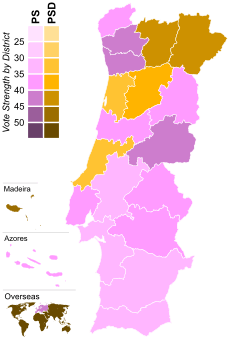 Results by district or autonomous region. | |||||||||||||||||||||||||||||||||||||||||||||||||||||||||||||||||||||||||||||||||||||
| |||||||||||||||||||||||||||||||||||||||||||||||||||||||||||||||||||||||||||||||||||||
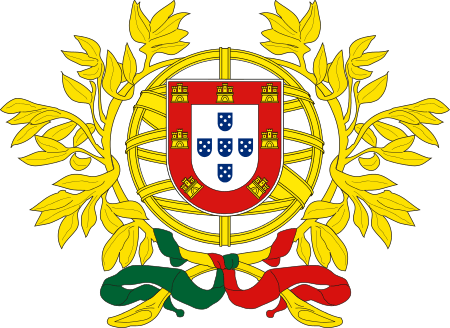 |
|---|
| This article is part of a series on the politics and government of Portugal |
| Constitution |
|
|
Legislature
|
|
|
|
The Socialist Party of Prime Minister José Sócrates came in first despite losing 9% of the vote and 24 seats.
In these elections there were approximately 9.5 million Portuguese at home and abroad called to determine the 230 seats in the Assembleia da República and 18th constitutional government in Portugal after 1976. The Socialists won the election with a clear lead over the conservative Social Democrats, with big gains for the People's Party and for the Left Bloc.
The election took place during the regular end of the previous four-year legislative period. From 2005 to 2009 ruled by the Socialist Party (PS), led by José Sócrates, with an absolute majority. The opinion polls at the beginning of the official election campaign on 12 September 2009, showed a too close to call race between the Socialists and the conservative Social Democrats,[8] but just days before the election the Socialists increased their lead over the Social Democrats.[9] A total of 13 parties and two coalitions competed in this election.
Focus of the campaign was the impact of global economic, the financial crisis and the construction of new infrastructure projects, including the high-speed rail link Lisbon-Madrid and Lisbon-Porto-Vigo, and the new Lisbon airport.
Neither of the two major parties won an absolute majority in the Assembly of the Republic, so, the future prime minister had to form a coalition, or at least rely on other parties to govern. In that case, José Sócrates was in a better position than Manuela Ferreira Leite, since the Portuguese left won by 54.23% of the vote and 128 seats, against 39.54% and 102 deputies to the right.
On 12 October, José Sócrates was invited by President Aníbal Cavaco Silva to form government. The new cabinet was announced on 22 October and sworn in on 26 October.
Voter turnout was one of the lowest in Portuguese election history, as 59.7% of the electorate cast a ballot.
Background
In the February 2005 early elections, the Socialists, under the leadership of José Sócrates, won 45% of the votes and 121 MPs, the 1st time the Socialists won a majority and the 1st time a single party won a majority since Cavaco Silva's PSD victory in 1991. The PSD suffered a heavy defeat, achieving their worst results since 1983, and faced with this failure, the then PSD leader and outgoing Prime Minister, Pedro Santana Lopes, resigned from the leadership and called an election for party chair. In the party's congress in April 2005, Luís Marques Mendes became party leader winning 56% of the delegates, against the 44% of his rival, Luís Filipe Menezes.[10] During the first months in his government, Sócrates raised taxes to cut the deficit and initiated a policy of strict budgetary rigor. At the same time, he faced a very harsh summer with Wildfires across the country.[11]
That same October, the Socialists suffered a heavy defeat in the 2005 local elections, winning just 108 cities, a drop of 4, against the PSD's 158 mayoral holds. The PS was also unable to retake control of Lisbon and Porto. In January 2006, a new President was elected. Aníbal Cavaco Silva, PM between 1985-1995, became the first center-right candidate to win a presidential election, although only just. The PS candidate, former PM and President Mário Soares polled a disappointing third place with just 14% of the votes. In 2007, a referendum for the legalization of abortion was held. After the failure of the 1998 referendum, the Yes side prevailed winning 59% of the votes against the No's 41%, making abortion legal in Portugal.[12]
While the deficit reduction had been successful, and with the economy growing above 2% of GDP, the government faced heavy opposition for its policies, particularly from teachers unions. In March 2008, more than 100,000 teachers protested in Lisbon against Sócrates and his Education minister, Maria de Lurdes Rodrigues.[13] At the same time, the Social Democrats (PSD) were in internal crisis. The then PSD leader, Luís Filipe Menezes, elected in September 2007, resigned after just 6 months in the job.[14] In the following leadership elections, held on May 2008, Manuela Ferreira Leite became the first woman to lead a major party in Portugal, winning 38% of the votes, against the 31% of Pedro Passos Coelho and the 30% of Pedro Santana Lopes.[15]
Entering 2009, Portugal was strongly hit by the effects of the financial crisis that was shaking the global economy, and, therefore, the country entered in a recession. As a result, the government adopted stimulus measures that worsened the public finances and increased the deficit and the debt. In the European elections of June 7, 2009, the PSD stunned pundits by winning a European election for the first time since 1989, with 31.7% of the votes. The Socialists suffered a huge defeat, winning just 26% of the votes, a drop of 18%.
Electoral system
The Assembly of the Republic has 230 members elected to four-year terms. Governments do not require absolute majority support of the Assembly to hold office, as even if the number of opposers of government is larger than that of the supporters, the number of opposers still needs to be equal or greater than 116 (absolute majority) for both the Government's Programme to be rejected or for a motion of no confidence to be approved.[16]
The number of seats assigned to each district depends on the district magnitude.[17] The use of the d'Hondt method makes for a higher effective threshold than certain other allocation methods such as the Hare quota or Sainte-Laguë method, which are more generous to small parties.[18]
Parties
The parties that partook in the election, and their leaders, were:
- Left Bloc (BE), Francisco Louçã
- Democratic Unity Coalition (CDU), Jerónimo de Sousa
- Socialist Party (PS), José Sócrates
- Social Democratic Party (PSD), Manuela Ferreira Leite
- People's Party (CDS–PP), Paulo Portas
José Sócrates, leader of the Socialist Party, was nominated Prime Minister for a 2nd consecutive term.
Campaign period
Party slogans
| Party or alliance | Original slogan | English translation | Refs | |
|---|---|---|---|---|
| PS | « Avançar Portugal » | "Go forward Portugal" | [19] | |
| PSD | « Compromisso de verdade » | "Real commitment" | [20] | |
| CDU | « Soluções para uma vida melhor » | "Solutions for a better life" | [21] | |
| CDS–PP | « Não basta pensar. É preciso votar. » | "Thinking is not enough. You need to vote." | [22] | |
| BE | « Estamos prontos » | "We are ready" | [23] | |
Candidates' debates
| 2009 Portuguese legislative election debates | |||||||||||||||||||||
|---|---|---|---|---|---|---|---|---|---|---|---|---|---|---|---|---|---|---|---|---|---|
| Date | Organisers | Moderator(s) | P Present A Absent invitee N Non-inviteee | ||||||||||||||||||
| PS Sócrates |
PSD Leite |
CDU Jerónimo |
CDS–PP Portas |
BE Louçã |
Refs | ||||||||||||||||
| 2 Sep | TVI | Constança Cunha e Sá | P | N | N | P | N | [24] | |||||||||||||
| 3 Sep | SIC | Clara de Sousa | N | N | P | N | P | [24] | |||||||||||||
| 5 Sep | RTP1 | Júdite de Sousa | P | N | P | N | N | [24] | |||||||||||||
| 6 Sep | TVI | Constança Cunha e Sá | N | P | N | N | P | [24] | |||||||||||||
| 7 Sep | SIC | Clara de Sousa | N | N | P | P | N | [24] | |||||||||||||
| 8 Sep | RTP1 | Júdite de Sousa | P | N | N | N | P | [24] | |||||||||||||
| 9 Sep | TVI | Constança Cunha e Sá | N | P | P | N | N | [24] | |||||||||||||
| 10 May | RTP1 | Júdite de Sousa | N | P | N | P | N | [24] | |||||||||||||
| 11 Sep | RTP1 | Júdite de Sousa | N | N | N | P | P | [24] | |||||||||||||
| 12 Sep | SIC | Clara de Sousa | P | P | N | N | N | [24] | |||||||||||||
| Candidate viewed as "most convincing" in each debate | |||||||||||||||||||||
| Date | Organisers | Polling firm/Link | |||||||||||||||||||
| PS | PSD | CDU | CDS–PP | BE | Notes | ||||||||||||||||
| 12 Sep | SIC | Aximage | 45.6 | 30.2 | N/A | N/A | N/A | 24.2% Neither/Tie | |||||||||||||
Opinion polling
National summary of votes and seats
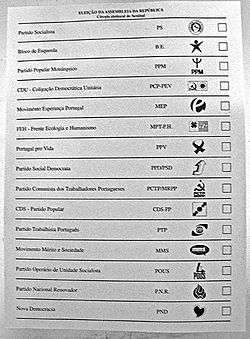
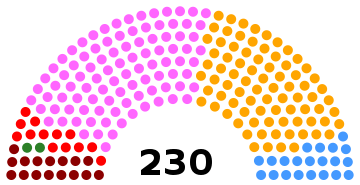 | ||||||||||
| Parties | Votes | % | ±pp swing | MPs | MPs %/ votes % | |||||
|---|---|---|---|---|---|---|---|---|---|---|
| 2005 | 2009 | ± | % | ± | ||||||
| Socialist | 2,077,238 | 36.56 | 121 | 97 | 42.17 | 1.15 | ||||
| Social Democratic | 1,653,665 | 29.11 | 71 | 81 | 35.22 | 1.21 | ||||
| People's | 592,778 | 10.43 | 12 | 21 | 9.13 | 0.88 | ||||
| Left Bloc | 557,306 | 9.81 | 8 | 16 | 6.96 | 0.71 | ||||
| Unitary Democratic Coalition[A] | 446,279 | 7.86 | 14 | 15 | 6.52 | 0.83 | ||||
| Portuguese Workers' Communist | 52,761 | 0.93 | 0 | 0 | 0.00 | 0.0 | ||||
| Hope for Portugal Movement | 25,949 | 0.46 | N/A | N/A | 0 | N/A | 0.00 | N/A | 0.0 | |
| New Democracy | 21,876 | 0.38 | 0 | 0 | 0.00 | 0.0 | ||||
| Merit and Society Movement | 16,924 | 0.30 | N/A | N/A | 0 | N/A | 0.00 | N/A | 0.0 | |
| People's Monarchist[B] | 15,262 | 0.27 | N/A | 2 | 0 | 0.00 | 0.0 | |||
| Earth / Humanist[C] | 12,405 | 0.22 | N/A | N/A | 0 | N/A | 0.00 | N/A | 0.0 | |
| National Renovator | 11,503 | 0.20 | 0 | 0 | 0.00 | 0.0 | ||||
| Portugal Pro-Life | 8,461 | 0.15 | N/A | N/A | 0 | N/A | 0.00 | N/A | 0.0 | |
| Labour | 4,974 | 0.09 | N/A | N/A | 0 | N/A | 0.00 | N/A | 0.0 | |
| Workers Party of Socialist Unity | 4,632 | 0.08 | 0 | 0 | 0.00 | 0.0 | ||||
| Earth[B][D] | 3,265 | 0.06 | N/A | 2 | 0 | 0.00 | 0.0 | |||
| Total valid | 5,505,278 | 96.91 | 230 | 230 | 100.00 | — | ||||
| Blank ballots | 99,086 | 1.74 | ||||||||
| Invalid ballots | 76,894 | 1.35 | ||||||||
| Total (turnout 59.68%) | 5,681,258 | 100.00 | ||||||||
| A Portuguese Communist Party (13 MPs) and "The Greens" (2 MPs) ran in coalition.[25] B Elected in 2005 in the Social Democratic Party electoral lists. C Earth Party / Humanist Party joint electoral list only in continental Portugal. D Earth Party electoral list only in Madeira and Azores. | ||||||||||
| Source: Comissão Nacional de Eleições | ||||||||||
Distribution by constituency
| Constituency | % | S | % | S | % | S | % | S | % | S | Total S |
|---|---|---|---|---|---|---|---|---|---|---|---|
| PS | PSD | CDS–PP | BE | CDU | |||||||
| Azores | 39.7 | 3 | 35.7 | 2 | 10.3 | - | 7.3 | - | 2.2 | - | 5 |
| Aveiro | 33.8 | 6 | 34.6 | 7 | 13.0 | 2 | 9.0 | 1 | 3.8 | - | 16 |
| Beja | 34.9 | 2 | 14.6 | - | 5.7 | - | 10.0 | - | 29.1 | 1 | 3 |
| Braga | 41.7 | 9 | 30.8 | 6 | 9.7 | 2 | 7.8 | 1 | 4.6 | 1 | 19 |
| Bragança | 33.0 | 1 | 40.6 | 2 | 12.6 | - | 6.2 | - | 2.4 | - | 3 |
| Castelo Branco | 41.0 | 2 | 29.8 | 2 | 8.4 | - | 9.1 | - | 5.1 | - | 4 |
| Coimbra | 38.0 | 4 | 30.6 | 4 | 8.8 | 1 | 10.8 | 1 | 5.7 | - | 10 |
| Évora | 35.0 | 1 | 19.0 | 1 | 6.4 | - | 11.1 | - | 22.3 | 1 | 3 |
| Faro | 31.9 | 3 | 26.2 | 3 | 10.7 | 1 | 15.3 | 1 | 7.8 | - | 8 |
| Guarda | 36.0 | 2 | 35.6 | 2 | 11.2 | - | 7.6 | - | 3.3 | - | 4 |
| Leiria | 30.1 | 4 | 34.9 | 4 | 12.6 | 1 | 9.5 | 1 | 5.1 | - | 10 |
| Lisbon | 36.4 | 19 | 25.1 | 13 | 11.0 | 5 | 10.8 | 5 | 9.9 | 5 | 47 |
| Madeira | 19.4 | 1 | 48.1 | 4 | 11.1 | 1 | 6.2 | - | 4.2 | - | 6 |
| Portalegre | 38.3 | 1 | 23.8 | 1 | 8.0 | - | 10.8 | - | 12.9 | - | 2 |
| Porto | 41.8 | 18 | 29.2 | 12 | 9.3 | 4 | 9.2 | 3 | 5.7 | 2 | 39 |
| Santarém | 33.7 | 4 | 27.0 | 3 | 11.2 | 1 | 11.8 | 1 | 9.2 | 1 | 10 |
| Setúbal | 34.0 | 7 | 16.4 | 3 | 9.1 | 1 | 14.0 | 2 | 20.1 | 4 | 17 |
| Viana do Castelo | 36.3 | 3 | 31.3 | 2 | 13.6 | 1 | 8.6 | - | 4.2 | - | 6 |
| Vila Real | 36.1 | 2 | 41.1 | 3 | 10.1 | - | 5.5 | - | 2.9 | - | 5 |
| Viseu | 34.7 | 4 | 37.5 | 4 | 13.4 | 1 | 6.5 | - | 2.9 | - | 9 |
| Europe | 43.3 | 1 | 23.8 | 1 | 4.7 | - | 4.7 | - | 4.4 | - | 2 |
| Rest of the World | 22.0 | - | 54.5 | 2 | 3.2 | - | 2.0 | - | 1.0 | - | 2 |
| Total | 36.6 | 97 | 29.1 | 81 | 10.4 | 21 | 9.8 | 16 | 7.9 | 15 | 230 |
| Source: Comissão Nacional de Eleições | |||||||||||
Maps
- First, second and third most voted political force by district.
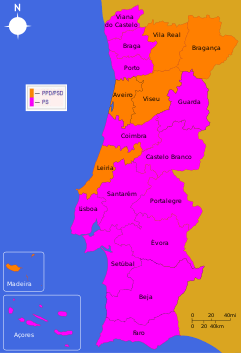 Most voted political force by district or autonomous region.
Most voted political force by district or autonomous region..png) Most voted political force by municipality.
Most voted political force by municipality.
References
- Assembleia da República - Deputados e Grupos Parlamentares
- Assembleia da República - Deputados e Grupos Parlamentares
- Assembleia da República - Deputados e Grupos Parlamentares
- Assembleia da República - Deputados e Grupos Parlamentares
- Assembleia da República - Deputados e Grupos Parlamentares
- http://www.mherrera.org/elections.htm
- Resultados das Eleições Legislativas 2009, Rádio e Televisão de Portugal, archived from the original on 3 March 2016, retrieved 27 September 2009.
- PS e PSD separados por dois pontos, Diário de Notícias, archived from the original on 28 September 2011, retrieved 11 September 2009.
- PS com vantagem de 8 pontos percentuais sobre o PSD, Rádio e Televisão de Portugal, retrieved 24 September 2009.
- Luís Marques Mendes é o novo líder do PSD, RTP, retrieved 7 December 2017.
- Incêndios de 2005 devastaram mais de 325 mil hectares, TVI24, retrieved 7 December 2017.
- Catholic Portugal votes to allow abortion in early pregnancy, The Guardian, retrieved 7 December 2017.
- 100 mil professores na rua, Expresso, retrieved 7 December 2017.
- Menezes demite-se e convoca eleições directas, SAPO, archived from the original on 8 December 2017, retrieved 7 December 2017.
- Manuela Ferreira Leite venceu eleições no PSD, RTP, retrieved 7 December 2017.
- "Constitution of the Portuguese Republic" (PDF). Archived from the original (PDF) on 3 March 2016. Retrieved 29 December 2019.
- "Effective threshold in electoral systems". Trinity College, Dublin. Retrieved 21 October 2015.
- Gallaher, Michael (1992). "Comparing Proportional Representation Electoral Systems: Quotas, Thresholds, Paradoxes and Majorities"
- "ELEIÇÕES LEGISLATIVAS DE 2009 – PS". EPHEMERA (in Portuguese). Retrieved 11 May 2020.
- "PSD – ELEIÇÕES LEGISLATIVAS DE 2009 – DISTRITOS". EPHEMERA (in Portuguese). Retrieved 11 May 2020.
- "CDU – ELEIÇÕES LEGISLATIVAS DE 2009". EPHEMERA (in Portuguese). Retrieved 11 May 2020.
- "CDS – PP – ELEIÇÕES LEGISLATIVAS DE 2009". EPHEMERA (in Portuguese). Retrieved 11 May 2020.
- "Legislativas 2009: uma retrospectiva da campanha do Bloco de Esquerda". BE (in Portuguese). Retrieved 11 May 2020.
- "Televisões e partidos acertam debates". RTP (in Portuguese). 29 August 2009. Retrieved 11 May 2020.
- Electoral results - Assembly of the Republic
.jpg)
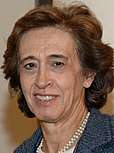
.jpg)
.jpg)
.jpg)